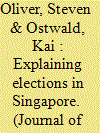| Srl | Item |
| 1 |
ID:
160630


|
|
|
|
|
| Summary/Abstract |
The People's Action Party (PAP) of Singapore is one of the world's longest ruling dominant parties, having won every general election since the country's independence in 1965. Why do Singaporeans consistently vote for the PAP, contrary to the expectations of democratization theories? We argue that valence considerations—specifically, perceptions of party credibility—are the main factor in the voting behavior of Singapore's electorate, and are critical to explaining the PAP's resilience. Furthermore, we argue that the primacy of valence politics arose in part by design, as the PAP has used its control of Singapore's high-capacity state to reshape society and thereby reshape voter preferences towards its comparative advantages. We use a multi-methods approach to substantiate this argument, including a comprehensive quantitative analysis of recent elections. Ultimately, our findings suggest that a focus on valence politics can increase the resilience of dominant parties, but that such a strategy also faces natural limits.
|
|
|
|
|
|
|
|
|
|
|
|
|
|
|
|
| 2 |
ID:
175593


|
|
|
|
|
| Summary/Abstract |
Singapore’s 2020 general election was held amidst the country’s most serious public health and economic crises in the country’s history. Despite expectations that these parallel crises would precipitate a flight to safety and result in a strong performance by the dominant People’s Action Party (PAP), the ruling party received its third lowest popular vote share (61.2%) and lowest ever seat share (89.2%) since independence. This article engages explanations for the unexpected results and argues that the vote swing against the PAP was enabled by a hitherto largely overlooked factor: the 2020 election included two opposition parties that could credibly compete with the PAP on the valence considerations that drive voting behaviour in Singapore, giving voters a perceived safe alternative to the PAP at the constituency level. Quantitative tests support the notion that party credibility—rather than demographic factors, incumbency advantages, Group Representation Constituencies, or assessments of the PAP’s fourth generation leaders—best explain variation in the vote swing against the PAP. Ultimately, the results suggest that the PAP’s monopoly on party credibility is no longer assured, thus portending greater opposition competitiveness and pressure against the PAP in future elections. Nonetheless, the PAP’s dominance remains intact and there is little evidence of a general appetite among the electorate for a non-PAP government, suggesting the likelihood of smaller course corrections rather than major steps towards democratization in the coming years.
|
|
|
|
|
|
|
|
|
|
|
|
|
|
|
|